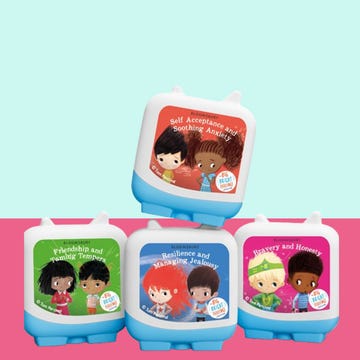Teaching children about the value of money and the importance of saving could be one of the most valuable life lessons you could impart.
A recent survey by Handelsbanken Wealth & Asset Management found over a third of UK adults say not saving consistently from a young age is their biggest financial regret, so starting a savings habit early on could really help set them up for life.
From a young age, children are often fascinated by money, whether they're playing shop with pretend coins, counting out their pocket money, checking the allowance you transfer into their accounts as they get older or encouraging you to spend your cash – on them of course!
Ensuring they understand the importance of saving first before spending it can avoid debt problems later on and instead allow them to achieve their financial goals.
A much-cited 2013 study by the University of Cambridge found that children understand the value of money from as young as seven years old. Crucially, the report urged parents not to underestimate the effect their own good (and bad) money habits have on their children.
Rather than just telling children to save, it found that a combination of good habits at home combined with simple and playful parenting and teaching resources is required in order for children to develop good money management skills, which are essential to help them become financially capable adults.
One of the report's co-authors, Dr David Whitebread of Cambridge University, said: "The 'habits of mind' which influence the ways children approach complex problems and decisions, including financial ones, are largely determined in the first few years of life. Simply imparting information is now recognised as being ineffective in this area. By contrast, early experiences provided by parents, caregivers and teachers which support children in learning how to plan ahead, in being reflective in their thinking and in being able to regulate their emotions can make a huge difference in promoting beneficial financial behaviour."
"Managing your finances well and learning about saving isn’t an innate skill, it needs to be learnt young through both education and real-world experience,” says Louise Hill, co-founder and COO of GoHenry, a financial education app.
Here's some help to make it easier for you to teach them how to save for themselves. Savings and investment may seem complicated, but passing on your wisdom now will give them the best chance at a brighter financial future.
Give them pocket money
Letting them take charge of their own money is important, so that means giving them some! You do need to be consistent and give it to them regularly – after all, they can’t budget or work towards a savings goal if they don’t know what they are going to get and how often.
You could also think about giving them extra money for chores. While it's good to teach them that most household jobs should be done as a family and not for pocket money, some things, such as cleaning the car, might merit a bit of extra cash.
Talk about it
"Talk about the reason you go to work, what earning money means, and what different things cost," advises Richard Stone, chief executive of The Share Centre. "You can even talk about investing – tell your children you own a little bit of the companies you shop in every day to spark their interest, or point out famous companies which are doing well or badly."
If they want to buy something, talk them through what chores they did to earn that money, what they will have left and what else they can do to earn it. If they still want to splash their cash, let them. They may love what they buy and if they don’t they’ll soon learn the useful art of budgeting.
Use tech
We all know kids love bright lights and devices, so use iPads, phones and apps to your advantage. There are kid-friendly apps, like GoHenry, where they can see their balance grow and what chores they have to complete to get their pocket money, or try Rooster Money that allows children to learn how and when to spend, save, give and grow their money.
"It doesn’t matter how much it is, it can be 5p or £5, but having their own pot of money means they have the autonomy to manage it themselves, which will set them up well for the future," says Louise Hill, of GoHenry. "It’s better to make a £20 mistake aged 8, rather than a £2,000 mistake aged 28."
Let them watch you manage your money
If you move your money into a savings account or ISA automatically then your child will only see you doing the spending. Teach them there’s more to money by letting them watch you save – whether that’s a digital transfer or saving your coins in a jar.
If you have an account for them, let them see their money grow with your contributions and interest rates. They might be more convinced to put it away if they can see where it goes and what happens to it.
And since children often copy what their parents do, set the right example from an early age and practice good financial habits such as setting aside regular time to look over your finances, sticking to a budget when shopping and so on. Take care of your finances and your child will follow suit.
Use other tools
Initiatives exist to help kick-start your kids' financial education. Try Discover Fortunes, a game available in schools or online that aims to provide financial education to young people; the Your Money Matters book is also a great resource.















